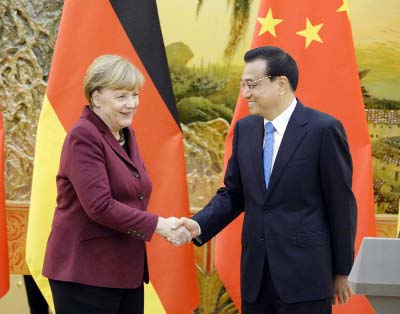
AP, Beijing :German Chancellor Angela Merkel and Chinese Premier Li Keqiang appealed Thursday for a political solution to Syria’s civil war as diplomats prepared to meet in Vienna for new peace efforts.The talks among diplomats from the United States, Russia, Iran and other governments are aimed at reviving a peace process toward an end of the 4-year-old war between President Bashar Assad’s government and rebel factions.”We both agree that we should work out a political resolution through diplomatic channels,” said Merkel at a news conference with Li. “I hope that we can soon have all the important parties sit down together to discuss the issues and offer substantial help to the Syrian people.”Diplomats are trying to revive the 2012 Geneva Communique, which called for creating a transitional government in Syria to oversee elections as part of a political transition. Also taking part in the talks are Turkey and Saudi Arabia.Germany, Europe’s biggest economy, is not part of the talks but Merkel is under political pressure to stem the flow of thousands of refugees from Syria and other countries into the country.Syria overshadowed efforts by Germany and China to use Merkel’s visit to forge closer commercial ties.Merkel, who was on her eighth visit to China since taking office in 2005, attended a signing ceremony with Li at which China committed to buying Airbus jets worth $17 billion.Merkel endorsed the addition of China’s yuan to the basket of currencies used by the International Monetary Fund, along with the dollar, the euro, the pound and the yen. That change would have limited practical effect but is sought by Beijing as a symbol of China’s rising status in the global economy.Meanwhile, Alexander Sokolov proudly showed black-and-white pictures of himself snapped more than 30 years ago at a Soviet military base outside Kabul, the Afghan capital, where he served as a communications officer.Sokolov said he thinks the USSR left Afghanistan undefeated after the 1979-1989 invasion, because the pro-Moscow government held on for three more years before the country slid into a devastating civil war.The 1991 Soviet collapse appeared to have brought an end to Moscow’s superpower ambitions in the Muslim world. But when it comes to summarising the impact of the invasion on his generation, the gaunt, gray-haired 54-year-old grows serious and sad.The invasion of Afghanistan claimed the lives of at least 15,000 Soviet soldiers, mostly conscripts in their late teens or early 20s, and left tens of thousands wounded and psychologically traumatised. “We were forgotten,” Sokolov told Al Jazeera, sitting on a sofa in his one-bedroom apartment in Moscow.”Most of the guys are now unhappy because of this war. They drink, or they are sick or disabled, and the state does not pay any attention to them. Of course, this is tremendous pain.” “Pain” is the name of an NGO Sokolov heads that helps war veterans overcome bureaucratic hurdles to get medical treatment, benefits – or a free land lot at one of Moscow’s graveyards.

